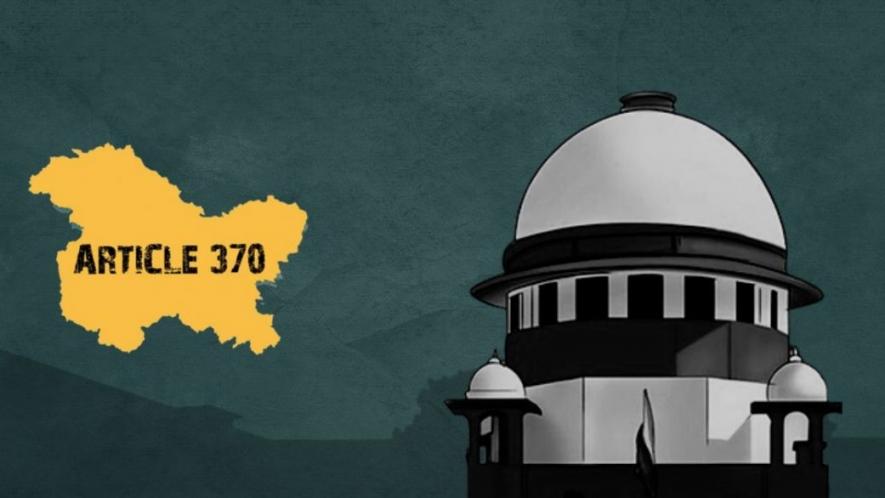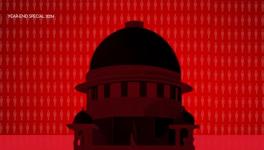Article 370 Hearings: Recap of the First Nine days

A five-judge Bench of the Supreme Court headed by Chief Justice of India Dr D.Y. Chandrachud and comprising Justices S.K. Kaul, Sanjiv Khanna, B.R. Gavai and Surya Kant, is hearing a batch of petitions challenging the August 5, 2019 decision to end the autonomy guaranteed to J&K under Article 370 of the Indian Constitution. We provide you the major highlights of each day and memorable quotes.
To understand the legal history of the case better, read the curtain-raiser here.
Day 9 of the hearings
Highlights
- Senior advocate Nitya Ramakrishnan argued that shared sovereignty was a basic feature of multi-tier democracies and that Article 370 represents a merger of the will of the people of J&K with the will of the people of India.
- Advocate Manish Tewari spoke on behalf of an intervenor from Arunachal Pradesh about the possible implications of the case on the special provisions for various states in northeastern states. Solicitor General Tushar Mehta assured the court that the Union government was clear of the distinction between temporary provisions under Article 370 and special provisions with regard to other states which includes the Northeast. He said the Union government has no intention to touch any part which gives special provisions to certain states and territories.
- The Chief Justice of India Dr D.Y. Chandrachud and senior advocate Gopal Sankarnarayanan discussed whether Article 370 had worked itself out of the Constitution after 1957. The CJI wondered aloud if Article 370(2) contained the seeds of the de-operationalisation of the entire Article once the Constituent Assembly of J&K had been constituted. He also asked why the Constitution of J&K was not mentioned anywhere in the Constitution of India.
Who said what
- Senior advocate Nitya Ramakrishnan: “Sovereignty is essentially divisible as the nation-state is an association of associations and legal sovereignty is spread over various units.”
- Nitya: “Even if J&K flows with milk and honey, the argument that in order to secure people their constitutional rights and development, we have to destroy their entity and statehood is an unacceptable argument.”
- Senior advocate Gopal Sankarnarayanan: “This [de-operationalisation of Article 370 ] is an encroachment on something we cherish the most— our Constitution [of India]. Kashmir is just an avenue.”
Read the full report on Day 9 of the hearings here.
Background
A batch of petitions, In Re Article 370, challenges The Constitution (Application to Jammu and Kashmir) Order, 2019 (Presidential Order C.O. 272), which used Article 370(1)(d) to extend all provisions of the Indian Constitution, including its “exceptions and modification” to apply in relation to J&K.
Article 370 (Article 306A of the Draft Constitution) was a temporary provision added to the Indian Constitution as a result of the Instrument of Accession signed on October 27, 1947, by the last Dogra Maharaja of J&K, Maharaja Hari Singh.
The document provided for special constitutional status to Jammu and Kashmir.
The Instrument of Accession was a declaration made by the erstwhile ruler of the then-independent princely state of Jammu & Kashmir and the then Governor General of India, Lord Louis Mountbatten, to conditionally accede to the dominion of India as explained by The Leaflet here.
On July 18, 1947, the British Parliament passed the Indian Independence Act. Under Section 1(1) of the Act, two independent sovereign countries, namely India and Pakistan, were to come into existence. The 584 ‘princely states’ under British rule in the Indian subcontinent were given an opportunity to accede to either dominion.
The Act provided that a State shall be deemed to have acceded to a dominion if the Governor General of that dominion had signified his acceptance of an Instrument of Accession executed by the ruler of the State.
However, Jammu and Kashmir did not immediately accede to either of the dominions. The maharaja signed a standstill agreement with Pakistan, but India refused to sign a similar agreement.
Finally, under pressure from a popular rebellion against his rule and with an intervention of Pakistani tribesmen and, later, regular forces, the maharaja decided to conditionally accede to India. However, the terms of Instrument of Accession added that the accession shall not be deemed to be a commitment in any way to “acceptance of any future Constitution of India”.
Preliminary issues raised in the petitions
- The procedure adopted in abrogating Article 370 is manifestly arbitrary, contrary to the principles of the constitutional scheme of India and J&K, and is violative of the principle of rule of law which is a part of the basic structure of the Constitution.
- The Presidential Order C.O. 272 incorrectly invokes Article 370(1)(d) to amend the proviso to Article 370(3).
- Article 370(1) only allows certain provisions of the Indian Constitution to be applicable to the State of J&K. It neither allows the creation of a fresh constitutional provision, which is the addition of clause (4) to Article 367 (interpretation), nor the application of “all provisions of the Indian Constitution” to the State to an extent which results in a wholesale replacement of the Constitution of J&K.
- The amendment to Article 367 by adding clause (4) by replacing “Constituent Assembly of the State” to read “legislative assembly of the State” and thereby nullifying the effect of Article 370 is a colourable exercise of power.
- The “concurrence” mentioned in the Presidential Order C.O. 272 has to be the recommendation of the Constituent Assembly as per Article 370(3). The concurrence on which the Presidential Order C.O. 272 is based does not have sufficient constitutional foundation.
- The “consent” to the Presidential Order C.O. 272 was invalidly given, as powers under the President’s rule are “coterminous” with that of the legislative assembly of the State. However, Article 147 of the Constitution of the State bars the Legislative Assembly from “seeking to make any change in the provisions of the Constitution of India in relation to the State”. So, since the legislative assembly could not have given its consent to the Presidential Order C.O. 272, nor could the governor.
- Alternatively, that the legislative assembly of J&K does not possess the constituent powers to recommend a modification to Article 370. Moreover, once the Constituent Assembly ceased to exist, Article 370 was “frozen in time”.
- The transfer of power under the President’s rule is purely temporary in nature. During such a proclamation, making fundamental federal change is unconstitutional.
- By bifurcating the State of J&K into two Union territories is a violation of Articles 1 and 3 of the Indian Constitution which does not allow retrogression of statehood.
What has transpired in the hearings so far?
Highlights
- The court finally began hearing a batch of petitions challenging the abrogation of Article 370. Senior advocate Kapil Sibal, representing one of the petitioners, termed the hearing “historic”.
- The court and one of the petitioner’s counsel found themselves on different sides on the issue of whether clause(3) of Article 370 of India remains applicable after the Constituent Assembly of J&K ceased to exist in 1957.
- Since the court and petitioner were unable to agree on whether Article 370 has assumed a permanent character, the court will have to determine whether the Instrument of Accession and its conditions remains enforceable irrespective of the legislative powers exercised by India.
Who said what
- Senior Advocate Kapil Sibal (for petitioner, former speaker of the J&K legislative assembly Mohd. Akbar Lone): “The [Supreme Court’s hearing on abrogation of Article 370 is] historic because it took My Lords five years to hear this case. And for five years, there has been no representative government in the state of J&K.”
- Sibal: “Government of the day was staring at the provision of Article 370. According to me, through a political act and not a constitutional procedure declared Article 370 is gone… Such a political act cannot be determined by the Parliament”.
- Chief Justice of India Dr D.Y. Chandrachud: “Article 370 specifically uses the expression ‘temporary’. Can we then say that the powers under clause (3) of Article 370 come to an end and this converts Article 370 into a permanent provision which it was never intended to be?”
Highlights
- The court and the lead petitioner’s counsel continued to debate whether Article 370 of the Indian Constitution had attained a permanent character. Adding to Day 1’s discussion, it is to be explored now whether the Constitution of J&K gave permanency to Article 370 of the Indian Constitution.
- While senior advocate Kapil Sibal argued that Article 370 can never be abrogated, the Bench wondered whether Article 370 could be considered “basic structure of the Indian Constitution” or, as the CJI put it, “a new category over and above the basic structure”. Sibal refused to engage with the question, telling the Bench that his only submissions in this regard is that a procedure has been laid down regarding Article 370, and it does not contain a mechanism for its abrogation.
- Sibal walked the court through events in J&K before the autonomy guaranteed to J&K under Article 370 was abrogated on August 5, 2019. He mentioned how the Bharatiya Janata Party withdrew from the governing alliance with the Peoples Democratic Party (PDP), how the governor said he had not received a fax where National Conference and PDP had expressed a desire to form a new government (which would have had a majority in the assembly) but “dissolved the assembly in a hurry”. This was part of his attempt to establish that the August 5 Presidential Order was a “political” and not a “constitutional” act. Justice Kaul rejoined that all constitutional acts have a political dimension as well.
Who said what
- Justice Dr D.Y. Chandrachud: “Even when Parliament amends the Constitution, it is not exercising the powers of a Constituent Assembly. It may be exercising a constituent power; the power to amend.””
- Justice S.K. Kaul: “Two major points on my mind are this: Firstly, Article 370 has acquired a permanent feature of the Constitution. That is still a debatable issue… Next is, suppose it is not permanent, then what is the manner of abrogating Article 370? Is the procedure followed up?”
- Senior advocate Kapil Sibal (for the petitioner Mohd. Akbar Lone, former speaker of J&K legislative assembly): “Legislative assembly of J&K cannot exercise the [amendment] power under clause (3) of Article 370. That is why, [the Parliament] converted the legislative assembly into a constituent assembly of the State… [Doing so] is unheard of. [A legislature] cannot arrogate to [itself] a power which [it] does not have.”
Highlights
- The CJI and Sibal debated whether it was enough for the Constituent Assembly of J&K to affirm their decision to remain with India subject to the safeguards of Article 370 to assume that Article 370 attained a permanent status. While the CJI suggested that a parliamentary intervention of India may have been required, Sibal rejected this argument. He said that unlike other states, J&K was “purely federal” as the residuary powers rested with the State. A proviso to Article 370(3) made it clear that the abrogation of Article 370 could only take place through the recommendation of the Constituent Assembly of J&K.
- Sibal emphasised that Article 367 of the Indian Constitution is an interpretation provision and it cannot be used to amend Article 370 through an executive Order. Through an amendment in Article 367, the Constituent Assembly of J&K was read as legislative assembly in Article 370. What the President did through the President Order C.O. 272 is an act of colourable legislation. The court seemed convinced with this reasoning.
- Senior advocate Kapil Sibal completed his arguments by extolling the court to recognise the historicity of the moment and the need to recognise the will of the people of J&K.
Who said what
- Senior advocate Kapil Sibal (speaking on how Indian Parliament converted itself into the Constituent Assembly of J&K and gave consent to itself to de-operationalise Article 370): “You [Parliament] recommend it to yourself because you have a political objective to recommend it and you take the decision yourself … because you are in a majority. This majoritarian culture cannot destroy the edifice which our forefathers gave us.”
- Sibal: “The people of J&K gave to themselves the Constitution the way people of India gave themselves the Constitution. Central to all this is the will of the people.”
- Sibal (speaking on the The Jammu and Kashmir Reorganisation Bill, 2019): “The principles of a representative form of government do not allow extinguishment of a state.”
Highlights
- Senior advocate Gopal Subramanium began his arguments by stating that the Constitution of India and the Constitution of J&K complement each other through the passage of Article 370.
- Today, the CJI asked Subramanium to address why the expression “Constitution of J&K” does not find a mention in Article 370.
- Zafar Shah, representing the J&K Bar Council, submitted that Article 370 presumes that Maharaja Hari Singh, who signed the Instrument of Accession, retained sovereignty in terms of exercising residuary powers for the State while India was conferred with the sovereign powers to make laws for matters specified in the Instrument of Accession.
Who said what
- Senior advocate Subramanium (for advocate Muzaffar Iqbal Khan): “These [Presidential Orders C.O. 272 & 273] completely do away with bilateralism built into Article 370(1) [which recognises that the Parliament can make laws for the State of J&K either with the consultation or concurrence of the State depending upon the subject with which the law is concerned].”
- Subramanium: “Article 370 of the Indian Constitution is not a repository of untrammelled application of the Indian Constitution [to the State of J&K].”
- Advocate Zafar Shah (for Bar Council of J&K): “What accession really means is that de facto the Union of India is in the possession of the State of J&K, but de jure the sovereignty is not transferred to the Union of India [in terms of the residuary powers of the State].”
Highlights
- When advocate Zafar Shah argued that Article 370 was added to maintain the constitutional autonomy of J&K as the State did not completely integrate with India, the Bench expressed its reservation and remarked that integration is complete and certain. Justice Khanna asked which Constitution is superior, the Constitution of India or the Constitution of J&K, Shah replied that of course it is the Constitution of India.
- Shah argued that the governor of J&K did not have the power to carry out the series of acts which he did before and on August 5, 2019, including recommending President’s rule and dissolution of the very Constitution (of J&K) under which he had taken an oath and was thus duty-bound to serve.
- When the CJI stated that there is a restraint in the power of the Parliament to make laws for states, but it does not bestow sovereignty upon them, Shah replied that while these fetters on the Parliament’s power to make laws vis-à-vis other states is a matter of concession, for J&K it is a matter of right which flows from Article 370.
Who said what
- Advocate Zafar Shah (for Bar Council of J&K): “I [State of J&K] am one of the federating units. I want to be with the Union of India. Article 370 as it is, is in the nature of a constitutional obstacle to integrate with the Union of India.”
- Shah: “We must understand the legal value trapped in the phrase ‘council of minister’, and not just the literal phrase. The legal value trapped in the phrase is a recognition of the will of the people, because the council of ministers represents the people of the State.”
- Shah: “Justice Kaul rightly called Article 370 a skeleton, because multiple Presidential Orders had hollowed it out. But, obviously, someone thought in 2019 that even that skeleton must go? Why? We (the people of J&K) were happy with the skeleton.”
Highlights
- Dr Rajeev Dhavan told the Bench that once the Instrument of Accession had been signed by Maharaja Hari Singh, the transfer of external sovereignty was complete. However, in the absence of a merger agreement, internal sovereignty of J&K was not lost. He told the Bench that Article 370 represents two powerful democratic movements— one of the people of India and the other of the people of J&K.
- Dhavan argued that autonomy of the kind J&K enjoyed was a necessary arrangement for a State as big and diverse as India. He demonstrated that it was not an arrangement unique to J&K.
- Dhavan told the Bench that the Constitution of India is transformative in nature, and it cannot be read literally but has to be read in light of constitutional morality.
Who said what
- Dr Rajeev Dhavan (for the petitioner J&K People’s Conference): “I take Article 370 to be the constitutional substitute for a standstill or merger agreement without which we are lost.”
- Dhavan: “On August 4, 2019, what constitutional autonomy were we about to lose? One answer to that is everything!”
- Dhavan: “Our constitution does not shy away from creating autonomous states, in fact it reinforces them.”
Highlights
- The CJI did not accept senior advocate Dushyant Dave’s argument that Article 370(3) is “dead” and stated that there must be logical consistency between the interpretation of Article 370(1), (2) and (3). Either all of it remains or they perish together.
- In Dave’s opinion, the reason of national security given by the executive for the abrogation of Article 370 was not relevant. He contended that the exercise was unreasonable. The CJI asked if he is inviting the court to judicially review the wisdom of executive action.
- Advocate Shekhar Naphade told the Bench that, howsoever, widely the powers under Article 370(1)(d) are interpreted, the core parts of the Constitution of J&K will prevail because it was the sole creation of Constituent Assembly of J&K.
Who said what
- Dushyant Dave (for the petitioner): “You cannot resort to some kind of executive power… authorise the President to do this, and do away with everything that Article 3 provides in the garb of Article 356 power. It makes a mockery of constitutional safeguards … because Your Lordship knows what happened in 1975.”
- Dave: “Article 370 was never intended to be permanent. It is a temporary provision. The entire burden of the applicability of Article 370 was left to the Constituent Assembly of J&K.”.
- Dave: “Article 370 is not just a letter but a reflection of the feelings of the people of J&K.”
Highlights
- Senior advocate Dinesh Dwivedi submitted that nothing in Article 370 remains after the Constitution of J&K was established in 1957. The court told him that such an argument opens a can of worms, not the least because it would mean no changes in the Indian Constitution made after 1957 could be extended to J&K.
- Dwivedi explained to the court how the accession of J&K to the dominion of India was different from all other Princely States (that were originally called Part B states) as reflected in the fact that Article 238 of the Indian Constitution (which applied to Princely States) did not apply to J&K.
- Senior advocate Chander Uday Singh, who limited his submissions to The Jammu and Kashmir Reorganisation Bill, 2019, told the court that the issue of ‘reorganisation’, i.e., loss of statehood and bifurcation, was separate from the issue of de-operationalisation of Article 370.
Who said what
- Senior advocate Dinesh Dwivedi, for petitioners advocate Manohar Lal Sharma and journalist Prem Shanker Jha: “Kashmir was different both in terms of accession to the dominion of India where it ceded at a different time as an independent State or a nation … and it was different in the sense that it did not merge, unlike other Princely States“.
- Dwivedi: “Our thinking is one nation, one Constitution— but where is that prescribed [in the Constitution of India]?”
- Senior advocate Sanjay Parekh, representing People’s Union for Civil Liberties: “The people of Kashmir came together and gave themselves a manifesto [called The Naya Kashmir]. In the manifesto, they said they want a Constitution and an economic plan for Kashmir. The J&K Constitution is a reflection of that manifesto.”
Gursimran Kaur Bakshi is a staff writer at The Leaflet
Get the latest reports & analysis with people's perspective on Protests, movements & deep analytical videos, discussions of the current affairs in your Telegram app. Subscribe to NewsClick's Telegram channel & get Real-Time updates on stories, as they get published on our website.
























